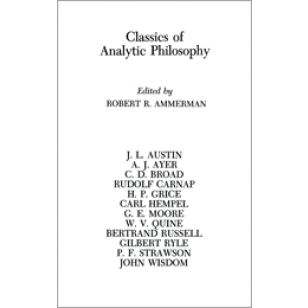Classics of Analytic Philosophy
This anthology of the central writings of the analytical tradition is widely regarded as the most useful such volume for teaching purposes. Clustered around issues in the philosophy of language, philosophy of mind, and metaphysics, many of the pieces were written in direct response to one another and illustrate a variety of approaches to key problems in the analytic tradition.
A reprint of the McGraw-Hill edition of 1965.
This anthology of the central writings of the analytical tradition is widely regarded as the most useful such volume for teaching purposes. Clustered around issues in the philosophy of language, philosophy of mind, and metaphysics, many of the pieces were written in direct response to one another and illustrate a variety of approaches to key problems in the analytic tradition.
Reviews:
“The best anthology I know of for a general course on 20th century analytic philosophy.”
—H. E. Baber, University of San Diego
“This is an absolutely perfect anthology. I was thrilled when I found that Hackett reissued this irreplaceable collection that exactly fits its title.”
—Michael Losonsky, Colorado State University
Contents:
A Short History of Analytic Philosophy.
Part I. The Early Analysts
1. RUSSELL, “Descriptions,” from Introduction to Mathematical Philosophy
2. RUSSELL, “What There Is,” from Lectures on Logical Atomism
3. RUSSELL, “Characteristics of Mental Phenomena,” From The Analysis of Mind
4. MOORE, “A Defence of Common Sense”
5. MOORE, “Proof of an External World”
6. BROAD, “The Traditional Problem of Body and Mind,” from The Mind and Its Place in Nature
Part II. Logical Positivism
7. AYER, I. “The Elimination of Metaphysics” II. “The Principle of Verification,” from Language, Truth and Logic
8. CARNAP, “Testability and Meaning”
9. QUINE, “Two Dogmas of Empiricism”
10. HEMPEL, “Problems and Changes in the Empiricist Criterion of Meaning”
Part III. Linguistic Analysis
11. MOORE, “Wittgenstein’s Lectures in 1930-1933”
12. WISDOM, “Philosophy and Psychoanalysis”
13. RYLE, I. “Descartes’ Myth.” II. “Psychology,” from The Concept of Mind
14. STRAWSON, “On Referring”
15. RUSSELL, “Mr. Strawson on Referring,” from My Philosophical Development
16. GRICE and STRAWSON, “In Defense of a Dogma”
17. AUSTIN, “Other Minds”
18. AUSTIN, “A Plea for Excuses”
Biographies
Selected Bibliography
Index

